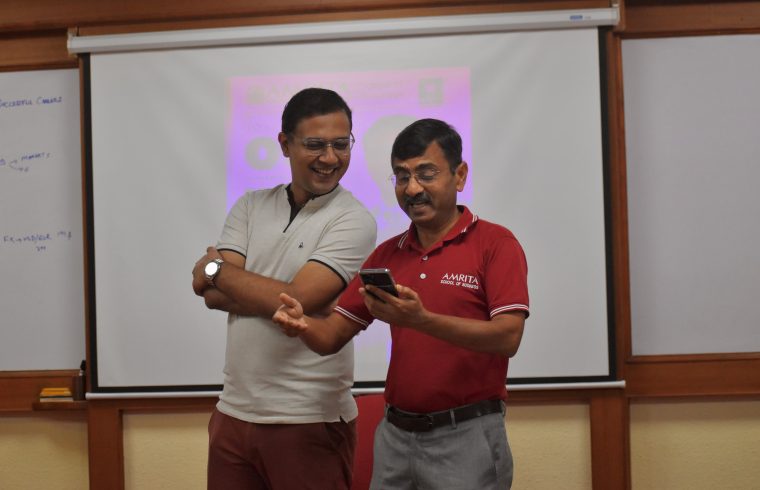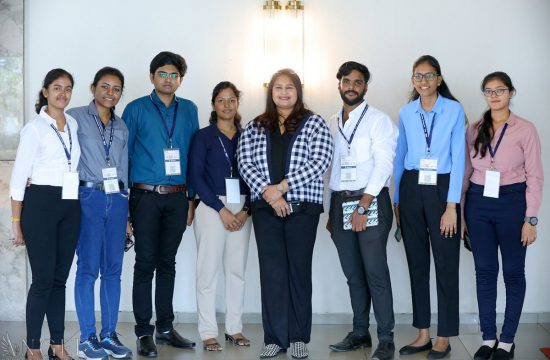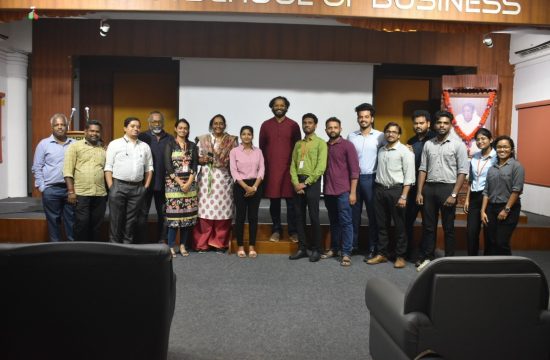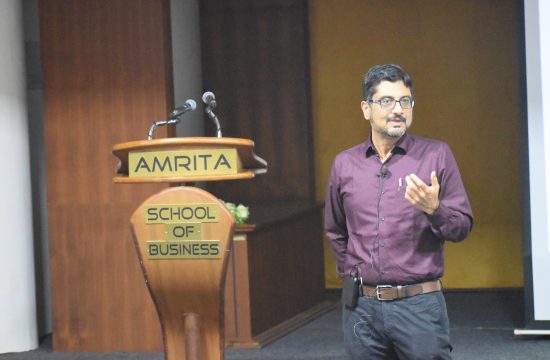On 5th November 2023, the Placement Committee (Placecom) of ASB organized an insightful alumni talk session featuring Mr. Sankar Rajan, a seasoned professional with a remarkable career journey in the corporate world. The session was an excellent opportunity for students to gain valuable insights into the corporate landscape, especially in finance, and the skills required to excel in their future endeavors.
Mr. Sankar Rajan is a Senior Vice President at BNY Mellon, a leading global investment banking company. With over 12 years of experience in the industry, he has held various positions of increasing responsibility, consistently demonstrating exceptional leadership and expertise in financial markets.
During the interactive session, he shared his in-depth knowledge and practical experiences, providing students with valuable guidance on navigating the corporate world. The key points discussed included:
- The Importance of Early Specialization:
Emphasizing the importance of early specialization, he highlighted the benefits of identifying one’s desired industry segment early in their career. Whether it is investment banking, commercial banking, or non-banking financial companies (NBFCs), having a clear focus allows for targeted skill development and career progression. - Continuous Learning – The Cornerstone of Success: His journey exemplifies the significance of continuous learning. After joining the industry in 2009, he proactively pursued relevant certifications, clearing CFA Levels 1 and 2 alongside their MBA. He emphasized the value of certifications, particularly the CFA when undertaken early in one’s career.
- Career Progression: Meritocracy over Seniority: His experience at CRISIL, where he rose from an Analyst to a Vice President (VP) in just four years, underscores the meritocracy that prevails in the finance industry. He highlighted that promotions are primarily driven by performance and delivery, rather than seniority
- FO vs. MO vs. BO: Understanding the Roles: He provided insights into the distinct roles of Front Office (FO), Middle Office (MO) and Back Office (BO) teams. FO professionals are responsible for revenue generation through activities such as selling, trading and investing. MO teams focus on risk management and control, while BO handles operational tasks such as trade settlement and reconciliation
- Networking: The Cornerstone of Success: He emphasized the power of networking, underscoring its significance in opening doors to opportunities and forging lasting professional relationships. He encouraged aspiring financiers to proactively engage in conversations with colleagues, industry veterans and potential mentors and never hesitate to ask them questions. Such interactions provide valuable exposure to diverse perspectives, industry trends, and potential job openings.
- Seizing Opportunities – A Proactive Approach: Seeking out opportunities to enhance one’s skills and expand responsibilities was another key theme highlighted by him. He advised aspiring financiers to take the initiative to approach managers and express interest in taking on additional projects or tasks. This proactive approach demonstrates eagerness, dedication, and a willingness to go the extra mile.
- The Importance of Continuous Learning: He stressed the importance of continuous learning and skill development in the ever-evolving world of finance. He recommended cultivating a habit of reading newspapers, staying abreast of industry news and developments, and actively seeking out training opportunities. Additionally, he encouraged aspiring financiers to pursue relevant certifications, such as the CFA (Chartered Financial Analyst) or FRM (Financial Risk Manager) designation, to further enhance their credentials.
- Transitioning from Middle Office to Front Office: For those aspiring to transition from the middle office (MO) to the front office (FO) of investment banking, he offered valuable insights, by suggesting an early move on one’s career, as jumping from MO to FO becomes increasingly challenging with time and seniority. He emphasized the importance of developing strong analytical and problem-solving skills, as well as a deep understanding of financial markets and investment strategies.
- Technical Skills: Essential Tools for Success: In addition to soft skills, he also highlighted the importance of possessing relevant technical skills. He recommended acquiring proficiency in programming languages such as Python, Excel VBA, and SQL, as these tools are widely used in financial modeling and analysis. Additionally, he encouraged aspiring financiers to familiarize themselves with financial modeling techniques, such as discounted cash flow (DCF) analysis.
The insights shared by him provide valuable guidance for aspiring financiers seeking to navigate the complexities and challenges of the industry. By emphasizing the importance of networking, proactive engagement, continuous learning, and skill development, they have laid out a roadmap for success in this dynamic and rewarding field.
Rithani R C (Batch 2025)











